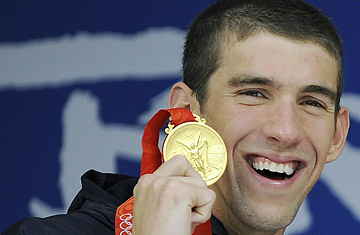
Michael Phelps stands on the podium after winning the men's 4 x 100-m medley relay. He has become the only person to win eight gold medals at the same Olympic Games
On Aug. 10, a few hours after Michael Phelps won his first gold medal and set his first world record in Beijing, he called his mom. "It seemed quite unusual," Debbie Phelps, who was traveling back to her hotel with daughters Hillary and Whitney after watching Michael's race, told TIME. "He just wanted to hear our voices. I think it was important for him to talk to his mom and sisters at that time."
They chatted — he asked about their trip to China — and Debbie, fully aware of Michael's challenging program to come, worried about whether her boy had tired himself out by swimming so fast so early. "I don't know why I asked; he knows what he needs to do to conserve his energy," she said.
They didn't hear from him again until after the 200-m freestyle on Aug. 12. Debbie missed his first call because her phone was buried in her bag. Phelps texted her, letting her know he was trying to reach them. "We were giving him support, letting him know how proud we were and that we stand behind him whatever the outcome might be," said Debbie. Sometimes, apparently, even Olympians just need their mother.
And the outcome, it turned out, was record-breaking: Today, Phelps made Olympic history by winning his eighth gold medal at these Games and becoming the greatest Olympic athlete ever. With a 50.15-sec. butterfly leg in the 4 x 100-m medley relay, Phelps, along with the U.S. team, set a new world record — and Phelps set a new bar for Olympic athletes to clear.
Just minutes earlier, 41-year-old Dara Torres, the oldest swimmer ever to compete in the Olympics, lapped the second-fastest time of the year in the 50-m freestyle and earned a silver medal, 0.01 sec. behind the winner. Along with her two other silver medals in relay races, her total Olympic haul is an impressive 12, just four shy of Phelps' 16.
Not a bad day for swimming history — and no one knows that better than the history makers. "For this to happen, everything had to fall into perfect place," Phelps said. "If we had to do this again, I don't know if it would happen exactly the way we wanted it to."
The men's relay closed out what will become one of the most memorable Games in swimming, with the U.S. leading the Water Cube medal count at 31, 12 of them gold — better than Athens' collection of 28, though not quite up to the horde of 43 that Mark Spitz's team amassed in 1972. But none of the athletes in the pool, American or otherwise, stood a chance of eclipsing Phelps. Taehwan Park of Korea and Kosuke Kitajima of Japan both snared Olympic titles and set a new standard for Asian swimmers at the élite level, but no other Olympian could come close to the frenzy that Phelps generated in the Water Cube, luring luminaries from two Presidents (George H.W. Bush and George W. Bush) to LeBron James and Kobe Bryant, who attended not just one but several of Phelps' races in Beijing.
"I am so blessed, so privileged to be here to watch him swim live," said Inge de Bruijn of the Netherlands. "He made me cry — tears of joy." And this from a two-time Olympic champion and Olympic record holder.
For Debbie, the feat is especially momentous. When Michael was in grade school, a teacher told her that her son would never be successful because he couldn't focus in the classroom. It turned out that he had attention deficit hyperactivity disorder, and while it made concentrating in class difficult, racing in the pool was a different story. "I thought maybe he's not as focused in the schoolhouse, but I saw a love and passion for swimming in him at a young age," said Debbie, who works as an educator and school principal. "He could be there for hours during a swim meet."
That singular determination was obvious at the Water Cube this week. In race after race, setting record after record, Phelps kept his body and mind trained on a set of goals that only he and coach Bob Bowman were privy to for these Games. While he still won't reveal the specifics, he did admit that he wrote them down — the first time he has documented his mission at a meet — and that "it all happened this week."
When you're talented enough to break world records nearly every time you race, and do it not just once or twice but eight times in a single meet, with the entire world watching, then half your battle is not against the swimmers in the other lanes but against your own demons, the ones that creep up when you hear your name announced over the loudspeaker or when you take your position on the blocks, ready to plunge into the water.
And nobody knows that better than Bowman. Having coached Phelps since he was 11, Bowman was the first to recognize the boy's talent, and he laid out a detailed plan to Phelps' surprised parents for making their son an Olympic champion. In the years since, Bowman, a psychology major, has become a master manipulator of Phelps, knowing just what buttons to push to propel his swimmer to another world record.
